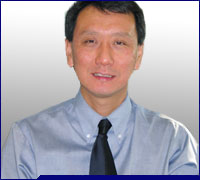The softer side of tech

More soft skills are needed among IT professionals to align technology with business, says IT veteran Yeo Shih Yeh.
Today's IT professionals lack soft skills like relationship building and communication, says Yeow, who's the general manager of Hitachi Asia's information technology center.
Such skills are important as IT professionals are expected to articulate the role of IT in the overall business strategy to senior management. It is also through good communication that they can better understand the users' problems, he explains.
|
"More often than not, there is too much focus on methodology among IT professionals and [too little] on communication skills. As a result, the industry tends to attract introverts," says Yeow, 45, a computer science graduate from Canada's Acadia University.
"The job's no longer just about coding and troubleshooting. It's also about talking and interviewing," he explains, adding that even experienced IT professionals are lacking in the soft skills department.
Polytechnics and universities have realized this, and they have begun to include business communications classes in their computing curriculum, says Yeow. "The new graduates are definitely more prepared compared to the past, where I only picked up skills like report writing on the job," he notes.
Yeow, a 20-year industry veteran started out as a fresh graduate, who like many others in his time, were uncertain about what he was in for when he took up an IT career. But he stuck to the field like a fish to water and has worked in several parts of Asia shortly after completing his degree.
In 1985, he returned to Singapore from Canada and took up an operations position at the then Telecommunications Authority of Singapore, the predecessor of the current Infocomm Development Authority of Singapore. One year later, he joined Singapore's National Computer Board and stayed for a year. In 1987, he moved on to U.S-based demographic profiling software maker MPSI.
In search of greener pastures elsewhere, he moved Down Under to join Australian IT firm Computer Power, where he worked for eight years. His stint gave him the opportunity to work closely with his company's clients, as he was stationed at the clients' premises for much of his career in Australia.
He returned to Singapore in 1995, where he embarked on the next stage of his career at Hitachi Asia. Proudly declaring that he recently received a long-service award from his Japanese employer, Yeow says Hitachi Asia is where he has served the longest.
Reminiscing on his long career, Yeow says: "For me, my days in computing school were an eye-opener because that was the first time I ever used a computer. Neither could I imagine we could have something like the Internet today, together with the related businesses and economy around it."
Youths today, he notes, are definitely more tech-savvy compared to the past. Many of them are well-positioned to embark on IT careers.
He notes also that a lot of today's new technology is hype, often clouded by the marketing arms of tech companies. "When ERP (enterprise resource planning) systems were introduced, not everyone needed it. I know one company, an early adopter of ERP, was struggling to maintain its expensive and proprietary ERP systems," he says.
Working in the IT industry is not without its challenges, Yeow admits.
Although it is difficult to ensure everyone in the IT department does not operate in silos, Yeow notes the importance of having everyone work together to understand the business of the organization. "Coding only provides the foundation for your career. You need to know your company's business," he says.
Filling in manpower gaps
Speaking from his regional experience, Yeow says the IT industry in countries like Vietnam and Thailand are experiencing rapid growth. "Those who left Vietnam during the war have come back to start their own IT businesses. They are beginning to leapfrog other countries in the region because they do not have legacy systems to worry about like mature markets in Singapore and Australia," he says.
"In Thailand, the local IT industry is facing a shortage of manpower, because the growth of the industry has outstripped the number of IT professionals," Yeow notes, adding that his Thai office has had IT workers jumping ship every six months.
